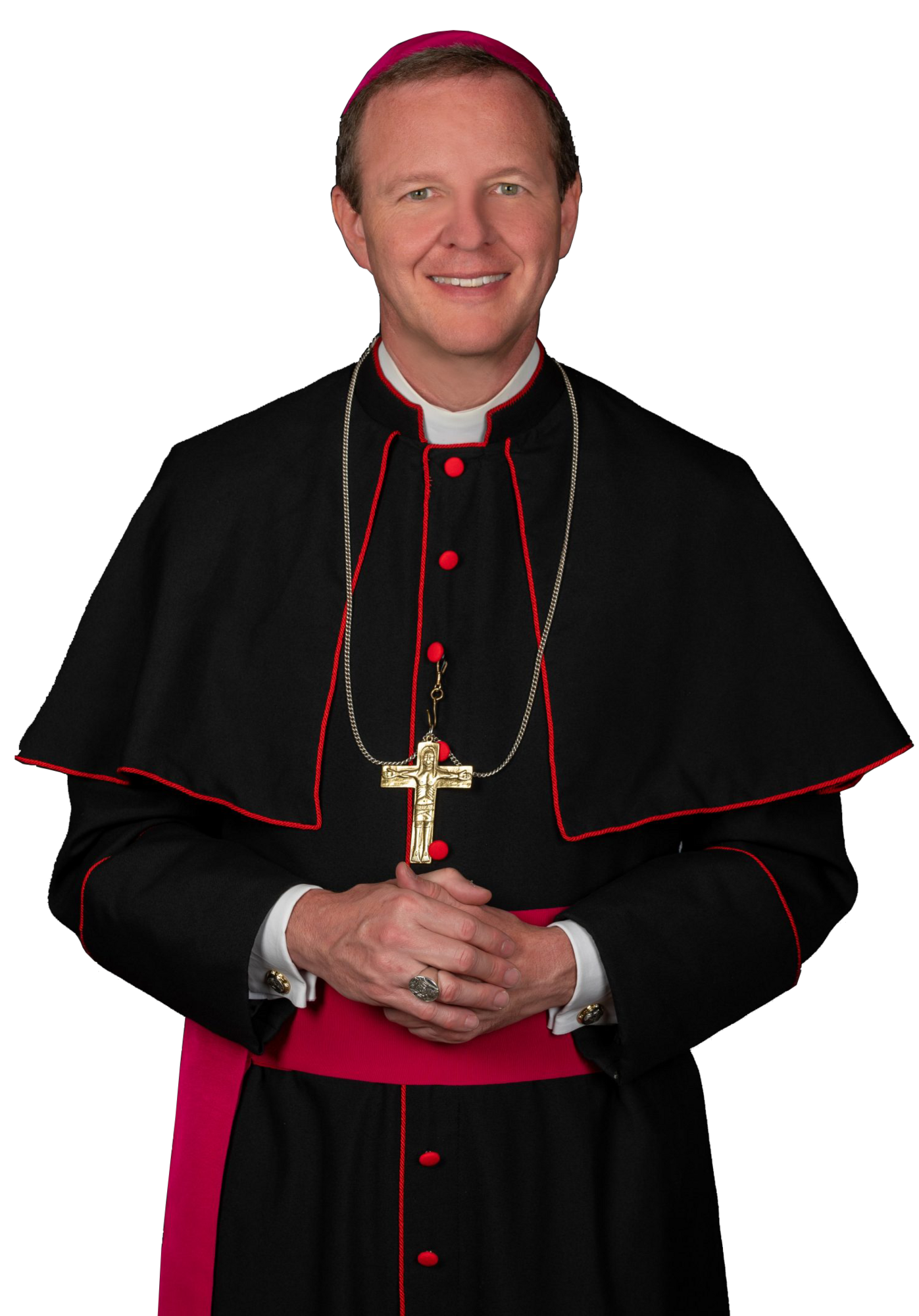Message From The Bishop
-
-
Message from the Bishop


-
Beyond BordersA Call to Christian Compassion
by Bishop Erik T. Pohlmeier
The concerns about immigration continue to captivate our country. Every day provides more news and stronger opinions. It is tempting to scan headlines and comments to find those who agree with our side. I am writing now to ask that we step back and look again.
I released a statement in February that suggests ways to look at policy affecting immigration. Since then, the issue has only intensified. I feel compelled to speak again because I find that many Catholics respond to their bishops along political party lines rather than from the heart of the Gospel.
The political reality of immigration is a serious issue. Bishops who speak out rightly highlight the need to protect citizens and borders, along with just laws for those seeking to migrate. But I write now to call on Catholics in the Diocese of St. Augustine to pause and examine this issue through the lens of the Gospel.
Jesus speaks clearly about caring for our neighbor and welcoming the stranger. As followers of Christ, we cannot set these truths aside when considering policies that shape modern society.
The Catechism of the Catholic Church, (paragraph 1902), quotes St. Thomas Aquinas: “A human law has the character of law to the extent that it accords with right reason, and thus derives from eternal law.” Eternal law requires a hierarchy of truths to properly guide the laws that govern our world. I ask each person of faith to reflect on those foundational truths before forming opinions about immigration.
Decisions about detention centers and immigration policy must begin with an understanding of human dignity and compassion. Jesus identifies himself with the prisoner and demands that his followers practice a higher standard of charity—one that surpasses politics.
Each of us must look in the mirror and ask whether our standard for compassion reflects the Gospel, which is built on Christ laying down his life for every sinner. Even when laws must be enforced, charity must not be abandoned. If our compassion falters, we fall short of the Gospel.
If our first question about an immigrant is, “Do they have legal papers?” we are failing to see the face of Christ. In every person, we must begin with the recognition that they are made in the image and likeness of God. This is the foundation of human dignity, which is never lost—not even by those who reject that image in themselves. Only with this foundation can we shape laws that reflect God's eternal law.
When our hearts are rooted in Christ’s love and our foundational truths are grounded, we can then assess what just laws should look like. Yes, nations have a right and duty to protect their borders and address violence and conflict. But those laws always impact people, and that demands an understanding of human dignity. Catholic teaching is clear: human dignity is not lost, even in sin. Every person deserves compassion, and special attention must be given to the poor and vulnerable.
Striking this balance has always been difficult. In today’s world, we must look beyond party lines and fix our eyes on Jesus, the source of all truth. He died even for those who took his life. That standard of sacrificial love is the great challenge of our faith.
We must apply this standard to immigration. The temptation is to begin by justifying stronger efforts to remove those who entered this country illegally. But that cannot be the starting point for Christians. Jesus commands us to see the person first, and then consider laws that allow the person to thrive. There is a line between removing those who intend harm and those who seek a better life. We must find that line—for the good of society and in faithfulness to the Gospel. This does not mean open borders, but it does mean laws that reflect the dignity of every person.
Some of those seeking a better life are already in our pews. They are part of our Church in the Diocese of St. Augustine. They are our brothers and sisters. I urge every Catholic in our diocese to look beyond the issue of border protection. Upholding Christian values means examining all social challenges in light of the Gospel.
Jesus calls us to sacrificial love—the kind he practiced on the cross. That is the highest value. And in a broken world, we are called to be its light.
Most Rev. Erik T. Pohlmeier
Bishop of St. Augustine
August 4, 2025
-
Más allá de las fronteras:Un llamado a la compasión cristiana
Una declaración sobre la inmigración
por el obispo Erik T. Pohlmeier
Las preocupaciones acerca de la inmigración continúan cautivando a nuestro país. Cada día hay más noticias y opiniones más fuertes. Es tentador dejarnos llevar por los titulares y comentarios que confirman nuestra postura. Les escribo ahora para pedirles que demos un paso atrás y miremos de nuevo.
Publiqué una declaración en febrero que sugiere formas de ver la política que afecta a la inmigración. Desde entonces, el problema sólo se ha intensificado. Me siento obligado a hablar de nuevo porque encuentro que muchos católicos responden a sus obispos a lo largo de líneas partidistas en lugar de desde el corazón del Evangelio.
La realidad política de la inmigración es un problema serio. Los obispos que hablan con razón destacan la necesidad de proteger a los ciudadanos y las fronteras, junto con leyes justas para quienes buscan migrar. Pero escribo ahora para hacer un llamado a los católicos de la Diócesis de San Agustín para que hagan una pausa y examinen este tema a través de la lente del Evangelio.
Jesús habla claramente sobre el cuidado de nuestro prójimo y la acogida del extranjero. Como seguidores de Cristo, no podemos ingnorar estas verdades al considerar las políticas que dan forma a la sociedad moderna.
El Catecismo de la Iglesia Católica (párrafo 1902) cita a Santo Tomás de Aquino: “La legislación humana sólo posee carácter de ley cuando se conforma a la justa razón; lo cual significa que su obligatoriedad procede de la ley eterna”. La ley eterna requiere una jerarquía de verdades para guiar adecuadamente las leyes que gobiernan nuestro mundo. Le pido a cada persona de fe que reflexione sobre esas verdades fundamentales antes de formarse opiniones sobre la inmigración.
Las decisiones sobre los centros de detención y la política de inmigración deben comenzar con una comprensión de la dignidad humana y la compasión. Jesús se identifica con el prisionero y exige que sus seguidores practiquen un estándar más alto de caridad, uno que supere la política.
Cada uno de nosotros debe mirarse en el espejo y preguntarse si nuestro estándar de compasión refleja el Evangelio, que se basa en Cristo dando su vida por cada pecador. Incluso cuando se deben hacer cumplir las leyes, no se debe abandonar la caridad. Si nuestra compasión flaquea, no alcanzamos el Evangelio.
Si al ver un inmigrante nuestra primera pregunta es: “¿Tienen documentos legales?”, no estamos viendo el rostro de Cristo. En cada persona, debemos comenzar con el reconocimiento de que está hecha a imagen y semejanza de Dios. Este es el fundamento de la dignidad humana, que nunca se pierde, ni siquiera por aquellos que rechazan esa imagen en sí mismos. Sólo con este fundamento podemos dar forma a leyes que reflejen la ley eterna de Dios.
Cuando nuestros corazones están arraigados en el amor de Cristo y nuestras verdades fundamentales están fundamentadas, podemos evaluar cómo deberían ser las leyes justas. Sí, las naciones tienen el derecho y el deber de proteger sus fronteras y abordar la violencia y los conflictos. Pero esas leyes siempre afectan a las personas, y eso exige una comprensión de la dignidad humana. La enseñanza católica es clara: la dignidad humana no se pierde, ni siquiera en el pecado. Cada persona merece compasión, y se debe prestar especial atención a los pobres y vulnerables.
Lograr este equilibrio siempre ha sido difícil. En el mundo de hoy, debemos mirar más allá de las líneas partidistas y fijar nuestros ojos en Jesús, la fuente de toda verdad. Murió incluso por aquellos que le quitaron la vida. Ese estándar de amor sacrificial es el gran desafío de nuestra fe.
Debemos aplicar este estándar a la inmigración. La tentación es comenzar por justificar esfuerzos más fuertes para expulsar a quienes ingresaron ilegalmente a este país. Pero ese no puede ser el punto de partida para los cristianos. Jesús nos ordena ver primero a la persona y luego considerar las leyes que permiten que la persona prospere. Hay una línea entre eliminar a los que tienen la intención de hacer daño y a los que buscan una vida mejor. Debemos encontrar esa línea, por el bien de la sociedad y en fidelidad al Evangelio. Esto no significa fronteras abiertas, pero sí leyes que reflejen la dignidad de cada persona.
Algunos de los que buscan una vida mejor ya están en nuestros bancos. Son parte de nuestra Iglesia en la Diócesis de San Agustín. Son nuestros hermanos y hermanas. Insto a todos los católicos de nuestra diócesis a mirar más allá del tema de la protección fronteriza. Defender los valores cristianos significa examinar todos los desafíos sociales a la luz del Evangelio.
Jesús nos llama al amor sacrificial, del tipo que practicó en la cruz. Ese es el valor más alto. Y en un mundo roto, estamos llamados a ser su luz.
Reverendísimo Erik T. Pohlmeier
Obispo de San Agustín
4 de agosto de 2025
-
